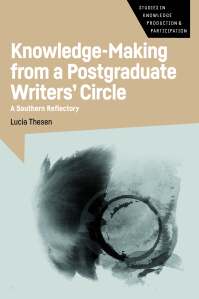This month we published Knowledge-Making from a Postgraduate Writers’ Circle by Lucia Thesen. In this post the author explains how the book came about.
 This book is a reflection arising from years of facilitation of a postgraduate writers’ circle, where scholars come together in a small room in an elite South African university, week after week, year after year, to share their work in progress.
This book is a reflection arising from years of facilitation of a postgraduate writers’ circle, where scholars come together in a small room in an elite South African university, week after week, year after year, to share their work in progress.
The circle is a radically open, multidisciplinary space, requiring no homework or preparation, other than to read, together in the room, up to two pages of writing-in-progress, to respond generously, and when ready, to share one’s work.
It was a wonderful experience – as unsettling as it was inspiring. The circle flowed and stuttered, surviving (and possibly thriving?) through decades that include the #RhodesMustFall student-led protests against the coloniality of the university experience, and the Covid 19 pandemic. Through the generosity, tears, tea and cake, lots of talking and some writing, I felt that there was something really important at the heart of the experience of being part of the writers’ circle – something that invited life in, rather than screening vitality off and writing it out of existence in the name of objectivity.
In Knowledge-Making from a Postgraduate Writers’ Circle: A Southern Reflectory, I reflect on what we might learn about the writing of research through the lens of the circle. The insights – glimpses of confidence, vulnerability, the need for the writing subject to find many pathways, to experience time differently, to cheat clock time by embracing now-time – reveal the writing of research as an immersive, affective and ethical project.
In the deep ethnographic dive into experience and memory, I became aware of the possibilities of trying out writing as a method of inquiry. As I wrote and thought about the circle, the idea of surface tension came to mind. I stayed with the idea, working and honing it into a concept that could travel across the book. In the physical sciences, surface tension is a form of relational energy at the interface between phases of matter. It has powerful resonance in everyday phenomena such as soap bubbles, and drops of water on a nasturtium leaf, when air and water meet. What if we think of writing as a form of surface tension? There’s the tension between what’s inside the writer’s head, and what’s outside, in the world. Writing is a subtle membrane between inside and outside, between self and other, an ethical encounter between the two. Writing is ethics. What will make it to the page? What is best left off? What styles are most apt? In wanting to write in depth about the circle, I also had to reckon with how I show up in the circle and in the world.
This sustained focus on postgraduate writing ‘in the middle’ forced me to take my eye off the product. I wanted to write differently, looking for the trace and the smudge along the way to explore the elasticity in the writing surface before the text settles into expensive, formal archives like libraries and journals. Perhaps this also requires a different kind of reading?
For more information about this book please see our website.
If you found this interesting, you might also like Foundational Concepts of Decolonial and Southern Epistemologies edited by Sinfree Makoni, Anna Kaiper-Marquez, Magda Madany-Saá and Bassey E. Antia.
